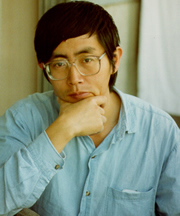
Exiled Chinese poet Bei Dao has given himself a tall order: Convince Notre Dames student poets that there is more to writing than wordplay. One must also have lived.
Bei Dao, whose real name is Zhao Zhenkai, uses the lives and works of a group of 20 th century poets to make his case. They include Federico Garcia Lorca, who was executed during the early days of the Spanish Civil War; and the Russian Boris Pasternak, whose famousDoctor Zhivagohad to be smuggled out of the country to be published. Bei Dao has befriended some more recently published poets, the Swedish poet Thomas Tranströmer and Gennady Aygi ofChuvash, an autonomous republic once part of the U.S.S.R.
I try to tell stories about their lives, besides doing close readings of their poems,says Bei Dao, a concurrent visiting professor of English and East Asian Languages and Literatures.I want the students to get a sense of the balance between time and personal destiny, between writing and suffering, between the form and the experience.Poetry isnt just a play on words. You have to gain certain life experiences.
He adds: Like all travelers, poets need a map to confirm their positions and to know how far they can go. My intention is to give my students this kind of map in an international sense.
One hopes that Bei Dao is including his own poetry, and his own story, as he teaches his class on 20 th century international poets. One need look no further thanhis life to see poetry inspired by circumstance.
In high school inBeijing,China, during Mao Zedongs Cultural Revolution, Bei Dao and his classmatesschool was shut down. They were sent to remote areas of the countryside, where he worked in construction for 11 years. Bei Dao laughs as he recalls his relief when the elite school first was closed:I was bad in mathematics and physics. They were important. I was afraid I wouldnt do well.
For a time, Bei Dao had been sympathetic to Maos ideas, butThe Cultural Revolution was an earthquake for us. We were on the top, then we were thrown to the bottom. It was the first time we realized that the reality ofChinawas far from the propaganda.
It wasnt just my destiny. It was a whole generation. We were city boys and girls. Suddenly, we were peasants.
Bei Dao never finished high school. But he never stopped thirsting for knowledge and literature. Literature was so difficult to come by that he and his friends snuck into libraries and homes in search of books. The best were calledyellow-covered,which were translations of modern literature from outside ofChina. Forbidden to all but the most highly ranked, these translations eventually made their way into Bei Daos literary circle.
Under that political pressure, we were so eager to find our spiritual counterpart,he recalls.
As he read, Bei Dao also began to write poetry that broke from the cultural norm of propaganda. Ashis work and that of his literary cohorts became published, they became known as theMisty Poets.
We really tried to avoid this official discourse which dominated the Chinese society for many years. We tried to create a different language, a departure from socialist- realism(the government-sanctioned literature).
In 1978, with Bei Dao as one of the founders, the literary journal Jintian (Today) was launched. The Misty Poets, and Bei Dao, were considered the voice of the pro-democracy movement, with snatches of one of Bei Daos poems appearing on posters during theTiananmen Squareprotests and subsequent fatal military crackdown. During those crucial days, Bei Dao was at a conference inGermany.I knew I was blacklisted. I knew I could not go back.His wife and daughter remained inChina.
A self-described nomad, Bei Dao lived in Europe for several years before immigrating to theUnited Statesin 1993. By his count, Notre Dame is the sixth or seventh American university where he has taught. He is currently married to a woman in publishing inChina, and they have a year-old son. Since he cant go back toChina, he will reunite with them while he is teaching inHong Kongthis summer.His wife and son will have to leaveChinato be with him in theUnited States.
Although the Chinese government shut down Jintian in 1980, Bei Dao was among exiled writers who revived it in 1990 as a forum for expatriate Chinese writers. They will have their first face-to-face editorial board meeting on campus March 20, when Notre Dame sponsors a 25 th anniversary celebration of Jintian.
Few of Bei Daos students have such a rich and painful background on which to draw.But I encourage students to take a break. I tell them, Dont just continue studying all the time. Gain life experience. Gain a view of the world. Go beyond this national boundary.
TopicID: 16922